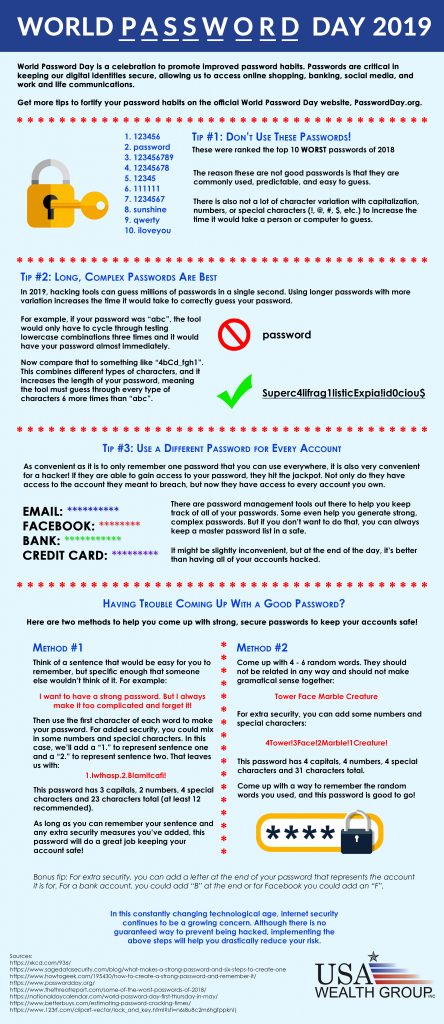For World Password Day, our affiliate company, USA Wealth Group put out a fun infographic about password safety.
Click the image below for a larger, zoomable version or continue reading below for the text version!
Tips for a More Secure Password
Passwords are critical in keeping our digital identities secure, allowing us to access online shopping, banking, social media, and work and life communications. Having a strong password allows us to do so with a lower risk of having our personal information breached.
Tip #1: Don’t Use These Passwords!
The following passwords were ranked the top 10 WORST passwords of 2018:
1. 123456
2. password
3. 123456789
4. 12345678
5. 12345
6. 111111
7. 1234567
8. sunshine
9. qwerty
10. iloveyou
The reason these are not good passwords is that they are commonly used, predictable, and easy to guess. There is also not a lot of character variation with capitalization, numbers, or special characters (!, @, #, $, etc.) to increase the time it would take a person or computer to guess.
Tip #2: Long, Complex Passwords Are Best
In 2019, hacking tools can guess millions of passwords in a single second. Using longer passwords with more variation increases the time it would take to correctly guess your password.
For example, if your password was “abc”, the tool would only have to cycle through testing lowercase combinations three times and it would have your password almost immediately. Now compare that to something like “4bCd_fgh1”. This combines different types of character, and it increases the length of your password, meaning the tool must guess through every type of characters 6 more times than “abc”.
Tip #3: Use a Different Password for Every Account
As convenient as it is to only remember one password that you can use everywhere, it is also very convenient for a hacker! If they are able to gain access to your password, they hit the jackpot. Not only do they have access to the account they meant to breach, but now they have access to every account you own.
There are password management tools out there to help you keep track of all of your passwords. Some even help you generate strong, complex passwords. But if you don’t want to do that, you can always keep a master password list in a safe. It might be slightly inconvenient, but at the end of the day, it’s better than having all of your accounts hacked.
Having Trouble Coming Up With a Good Password?
Here are two methods to help you come up with strong, secure passwords to keep your accounts safe:
Method #1
Think of a sentence that would be easy for you to remember, but specific enough that someone else wouldn’t think of it. For example:
I want to have a strong password. But I always make it too complicated and forget it!
Then use the first character of each word to make your password. For added security, you could mix in some numbers and special characters. In this case, we’ll add a “1.” to represent sentence one and a “2.” to represent sentence two. That leaves us with:
1.Iwthasp.2.BIamitcafi!
This password has 3 capitals, 2 numbers, 4 special characters and 23 characters total (at least 12 recommended). As long as you can remember your sentence and any extra security measures you’ve added, this password will do a great job keeping your account safe!
Method #2
Come up with 4 – 6 random words. They should not be related in any way and should not make grammatical sense together:
Tower Face Marble Creature
For extra security, you can add some numbers and special characters:
4Tower!3Face!2Marble!1Creature!
This password has 4 capitals, 4 numbers, 4 special characters, and 31 characters total. Come up with a way to remember the random words you used, and this password is good to go!
Bonus tip: For extra security, you can add a letter at the end of your password that represents the account it is for. For a bank account, you could add “B” at the end or for Facebook you could add an “F”.
In this constantly changing technological age, internet security continues to be a growing concern. Although there is no guaranteed way to prevent being hacked, implementing the above steps will help you drastically reduce your risk.

